How do you like your eggs?
Scrambled or separated? Plus summer reading and some piccies from my garden.

I had a great conversation with this week. A colleague, Bonnie, and I were talking about how we tend to scramble our eggs instead of separate them - a metaphor for how we get our emotions around a situation all scrambled up with the facts of that situation. I was sharing how I have been struggling watching my mum struggle with her declining mobility. And because I’ve been letting this stress me out, I’ve not had the energy to start and crack on with my own projects (apologies for that unintended pun!)
Bonnie gave me this fabulous metaphor of the egg. Emotions are the yolk, the whites are the facts. The shell is what we build around the experience to try to contain it. So what happens when we crack open the egg and separate the white from the yolk? And then consider them for what they are? What are the emotions? What are the facts? Are the emotions caught up in societal expectation or anticipatory pain? How do we see the situation differently when we separate each of those perspectives?
And then how might we view the situation if we consider the separated egg from the other person’s perspective. How are they perceiving the facts? What emotions are coming up for them?
I’m still working through my separated eggs, and I’m finding it a really useful exercise. I invite you to try it too if you have been scrambling some metaphorical eggs in your own life.
Sometimes it isn’t easy to bring some of the emotions to the surface, especially when we also feel guilty for feeling them. Sometimes we’d rather not admit or name them. Sometimes it’s easier to swallow those emotions back down with a biscuit.
Expressive Collage is a very useful tool for allowing these emotions to surface and be acknowledged. Collage is one of my favourite things to do when I’m out of words. My friend, Nela, referred me to the Substack of art psychotherapist, Shelley Klammer, and I’ve been binge-reading that this week.
Gardening is also my therapy. Pottering among the plants at this time of year, dead-heading and pruning to encourage a second flush of flowers, or just noticing the cycle of seed setting in some where others are only just starting to bloom… I find it all very calming.
Here are some pics of what’s been growing in my garden through June. The New Zealand flax (mentioned in my last post) is just bursting into flower (bottom right). I’ve given up fighting with the ground elder and let it flower (middle top). And I do love a rose: Buff Beauty (top left) is I think my all time favourite.
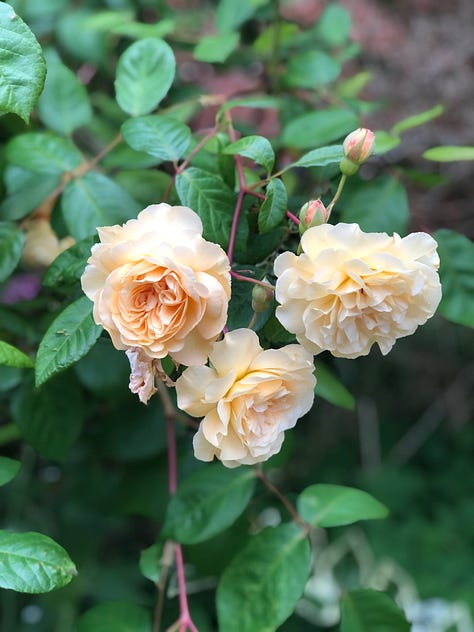
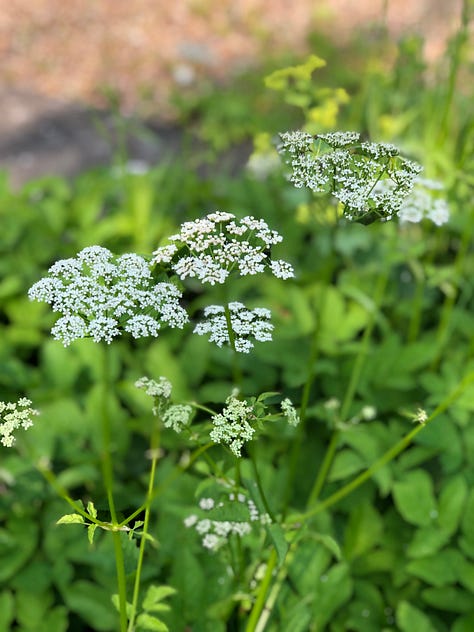
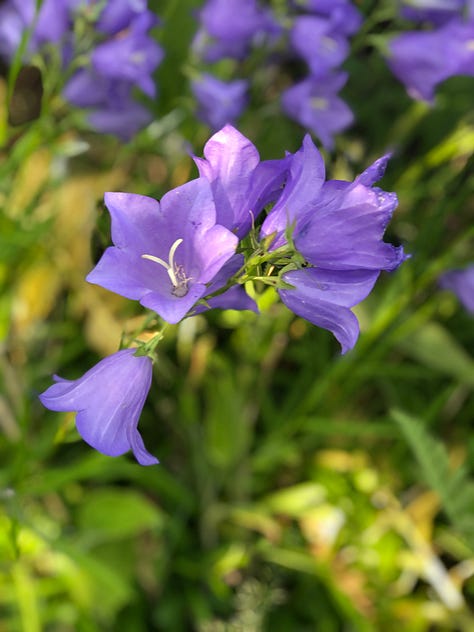
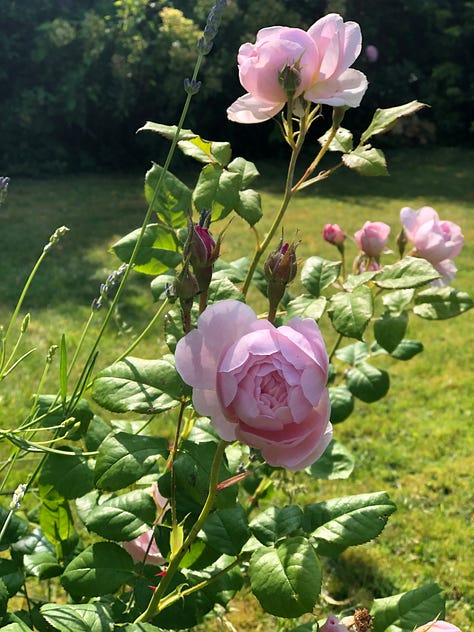

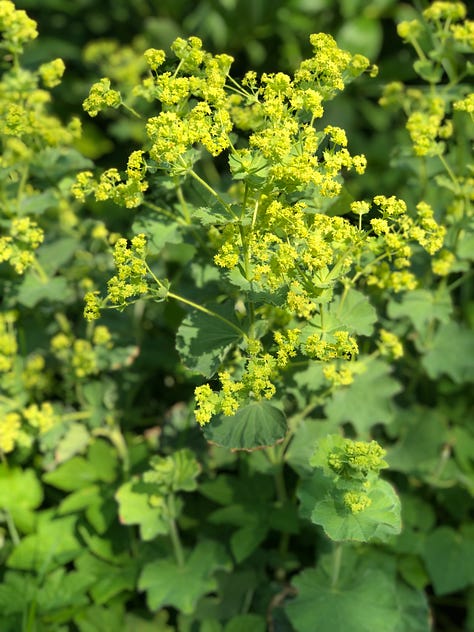
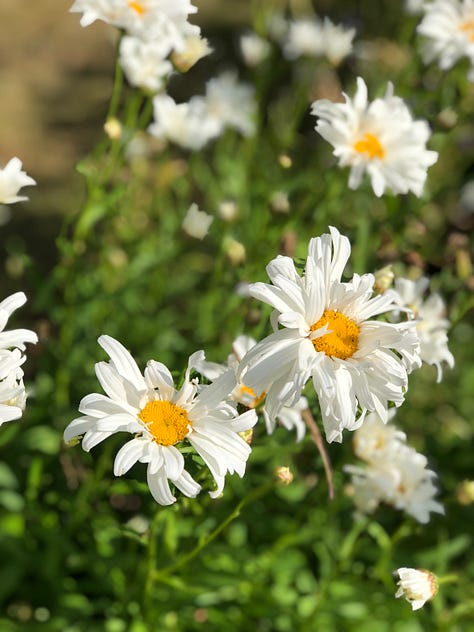


What I’m reading
I’ve been reading Why Women Grow: Stories of Soil, Sisterhood and Survival by Alice Vincent. She sets out to understand what compels women to work the soil, plant seeds and nurture them, and grow the gardens they love (whether on a balcony or over many acres) when so many other responsibilities sit upon their shoulders. Vincent’s book (and podcast) recovers the histories that have been lost among the soil and seeks to understand women’s lives, their gardens and what the ground offers them. Along the way she considers her own relationship to gardening and to the garden she is growing in parallel with researching the book. The variety of women’s stories is quite fascinating.
Also on my summer reading list is The Garden Against Time by Olivia Laing. My friend Alison loved this book and has lent it to me so I’m looking forward to getting into it. In 2020, Laing began to restore a walled garden in Suffolk. The work drew her into an investigation of paradise and its long association with gardens.
The blurb tells us: “Moving between real and imagined gardens, from Milton’s Paradise Lost to John Clare’s enclosure elegies, from a wartime sanctuary in Italy to a grotesque aristocratic pleasure ground funded by slavery, Laing interrogates the sometimes shocking cost of making paradise on earth.
But the story of the garden doesn’t always enact larger patterns of privilege and exclusion. It’s also a place of rebel outposts and communal dreams. From the improbable queer utopia conjured by Derek Jarman on the beach at Dungeness to the fertile vision of a common Eden propagated by William Morris.”
A new launch this month is Drawn from the Wild, by Caroline Ross (who writes Uncivil Savant here on Substack). It’s a practical guide to making your own foraged drawing materials - pastels, charcoal, inks. I learnt how to make my own pigments from Caroline on her Found and Ground course in 2022, and her first book Found and Ground is that course in a book. If you feel drawn to having a go at making your own art materials from foraging, I definitely recommend Caroline’s books. They are beautifully designed and photographed, and so easy to follow. Both books are published by Search Press (more info here).
One more book for my summer reading pile is A Different Kind of Power by Jacinda Ardern, former PM of New Zealand. Hubs and I went to hear her speak in London in mid June. But more about that next time…
Until then, enjoy these long days and summer sunshine…
Do you enjoy a good conversation? Join us in the Bones Tribe.
Our next gathering is Monday 21 July, we’ll be talking books.
The Bones Tribe is a monthly sacred circle to dig deeper and share thoughts, insights and experiences. We gather on Zoom and have had some great discussions so far; we also have occasional guests to spice up our conversations.
The Bones Tribe is exclusive to paid subscribers. A paid subscription is just £7 a month or £49 for a year and supports my work, research and writing. In addition to the Bones Tribe Circle, paid subscribers also now get a copy of my Gathering Bones ebook. If you’d like to try out the Bones Tribe before committing, then DM me, and I’ll gift you a one-month paid subscription.





Soulful fodder Tina! I am sorry you are experiencing this station in life. Our parental relationships reside deep within us, and as you point out, can benefit from separating the emotion from the journey, in order to gift ourselves a buffer. Guilt is a product of fear - so we ask ourselves what are we afraid of? The answer can be illuminating. I addressed it in my third book, A Practical Guide to Living Fearlessly, where I share my mother’s transition. And Im writing about it now in my latest practical guide, focused on love and relationships. Sending you a big hug!
Thank you Tina for an exquisite offering of writing…I always benefit in some manner from your Substack…I receive delicious food for my soul…this month was no exception…thank you so much for sharing your world with me…my heart is grateful🙏